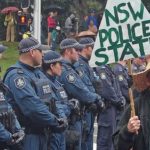Is a Strong Police Presence the Best Way to Deal with COVID-19?

As the world continues to grapple with COVID-19, questions are increasingly being asked about the use of police to ensure compliance both locally and abroad.
Here is what we know about the use of police during times of public health crisis.
Law Enforcement and Public Health
Over time there has been a gradual sharing of responsibilities of law enforcement and public health institutions.
Increasingly, we see crime being reframed as a ‘risk to health’ rather than merely a question of social order and morality.
This has led to increased sharing of information and resources between health and policing agencies. For example, modern ‘crime mapping’ and hotspot software was developed initially for the identification of emerging epidemics of communicable disease.
This is despite law enforcement and public health often having divergent goals. For example, alcohol and other drug professionals have amounted considerable evidence that policing hinders, rather than helps, goals of reducing drug-related harms.
The use of police during pandemics has been used since the early 19th century, albeit in a more limited capacity.
For example, police were utilised during the 1918 Spanish Flu, however the use of enforcement measures was limited, as the post-World War I population was accustomed to self-sacrifice and compliance with State orders.
Today, police are being asked to take a frontline role in preventing the spread of COVID-19 – in most cases by issuing fines when faced with non-compliance.
Is Policing During COVID-19 Working?
It’s too early for a comprehensive evaluation of whether policing efforts have played a major role during the pandemic.
However, Professors Stephen Reicher and Clifford Stott have noted that public compliance during pandemics isn’t likely to be motivated by the threat of external sanction.
Despite social media shaming to the contrary, global surveys indicate that most people are complying with COVID-19 restrictions.
The minority who are not complying are disengaged from the threat, tending to have a general scepticism of the pandemic and/or harbouring anti-State sentiments.
Instilling intrinsic motivation to follow public health orders appears to be the key factor in ensuring compliance.
Disengaged communities that have had ongoing tensions with government agencies (particularly the police) tend to have lower rates of compliance.
For example, the poorer and ethnically mixed suburbs in Paris, poverty-stricken counties in the United States and migrant populations within Melbourne public housing flats.
This disengagement is only likely to be exacerbated by policing efforts.
Moreover, there is some historical evidence that heavy handed policing during a pandemic can backfire. During the 1910 cholera epidemic in Italy, restrictions on burials led to attacks on health workers and the police.
Policing is effective if it’s consistent, proportionate and not viewed as targeted toward particular communities.
Overall, without an internal motivation to comply it’s unlikely that disengaged communities will alter behaviour in response to law enforcement.
What Are The Alternatives?
Whilst global evidence has not highlighted policing as a crucial factor during COVID-19, effective public health messaging continues to be cited.
Instilling the appropriate level of fear and concern regarding COVID-19 and trust in public health officials is crucial.
Surveys from Italy have found that even those who do not trust the government, most people believe in public health messaging and act appropriately in response.
Other proposals to address disengagement of poorer populations, have highlighted the possibility of economic relief as an incentive for compliance.
Whilst evidence is still emerging, it appears unlikely that increasing law enforcement efforts will reduce the rate of COVID-19 spread.






